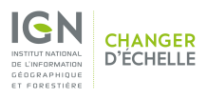Détail de l'auteur
Auteur Jie Guo |
Documents disponibles écrits par cet auteur (1)


 Ajouter le résultat dans votre panier Affiner la recherche Interroger des sources externes
Ajouter le résultat dans votre panier Affiner la recherche Interroger des sources externesDrought-vulnerable vegetation increases exposure of disadvantaged populations to heatwaves under global warming: A case study from Los Angeles / Chunyu Dong in Sustainable Cities and Society, vol 93 (June 2023)

Titre : Drought-vulnerable vegetation increases exposure of disadvantaged populations to heatwaves under global warming: A case study from Los Angeles Type de document : Article/Communication Auteurs : Chunyu Dong, Auteur ; Yu Yan, Auteur ; Jie Guo, Auteur ; et al., Auteur Année de publication : 2023 Article en page(s) : n° 104488 Note générale : bibliographie Langues : Anglais (eng) Descripteur : [Vedettes matières IGN] Applications de télédétection
[Termes IGN] changement climatique
[Termes IGN] climat urbain
[Termes IGN] données socio-économiques
[Termes IGN] espace vert
[Termes IGN] ilot thermique urbain
[Termes IGN] image Terra-MODIS
[Termes IGN] Los Angeles
[Termes IGN] Normalized Difference Vegetation Index
[Termes IGN] sécheresse
[Termes IGN] température au solRésumé : (auteur) Urban vegetation is valuable in alleviating local heatwaves. However, drought may decrease vegetation health and limit this cooling effect. Here we use satellite-based Normalized Difference Vegetation Index (NDVI) and Palmer Drought Severity Index (PDSI) to investigate the sensitivity of urban vegetation to drought in Coastal Greater Los Angeles (CGLA) from 2001 to 2020. We applied four statistical models to analyze the relations between 15 socioeconomic variables and the vegetation's sensitivity to drought. We then examined the changes in the cooling effect of the urban vegetation during drought and non-drought periods using remotely sensed land surface temperature (LST) data. The results suggest that economically disadvantaged areas with higher proportions of Hispanics and Blacks are typified by vegetation more sensitive to drought, which is likely linked to inequality in water use. Moreover, these populations experience a lower degree of vegetation cooling effects and higher exposure to heatwaves. The findings of this study imply that the potential of a community's vegetation in mitigating heatwaves is significantly influenced by the socioeconomic conditions of the community. Increasing the resilience of urban vegetation to drought in disadvantaged communities may help promote environmentally sustainable and socially resilient cities under a warming climate. Numéro de notice : A2023-191 Affiliation des auteurs : non IGN Thématique : IMAGERIE Nature : Article DOI : 10.1016/j.scs.2023.104488 Date de publication en ligne : 26/02/2023 En ligne : https://doi.org/10.1016/j.scs.2023.104488 Format de la ressource électronique : URL article Permalink : https://documentation.ensg.eu/index.php?lvl=notice_display&id=102972
in Sustainable Cities and Society > vol 93 (June 2023) . - n° 104488[article]











